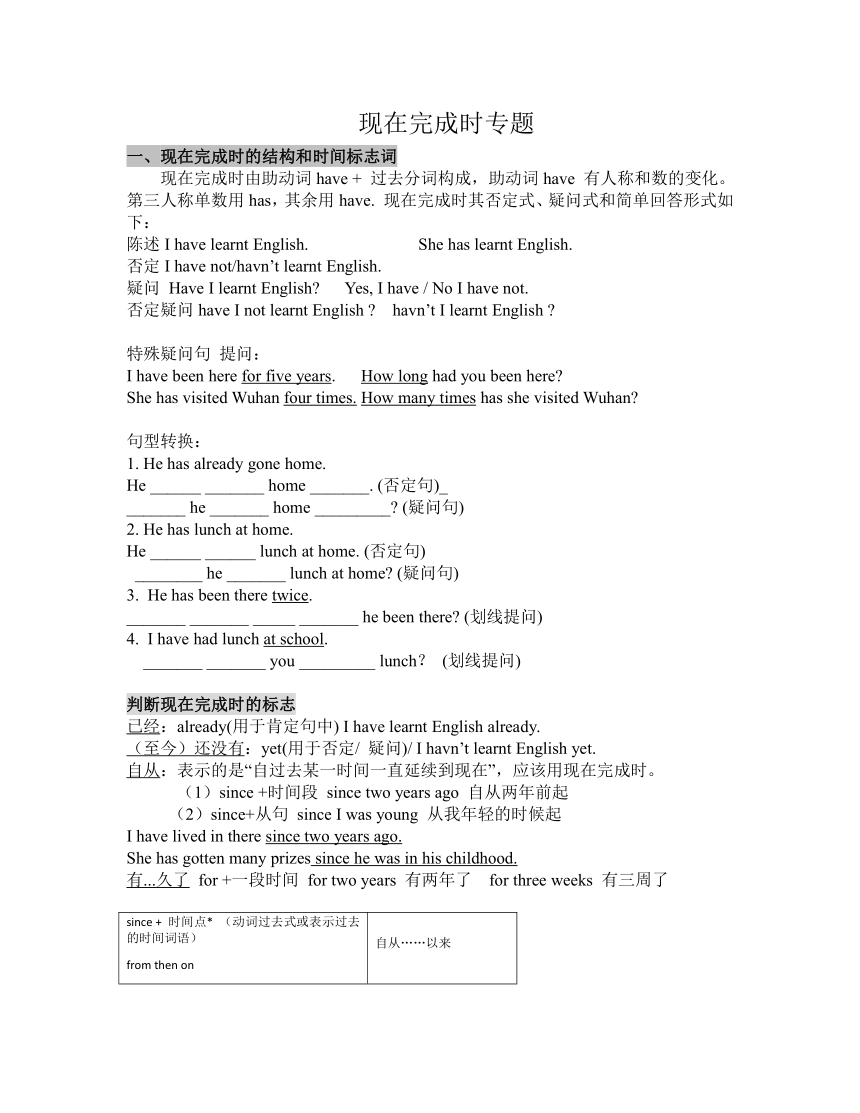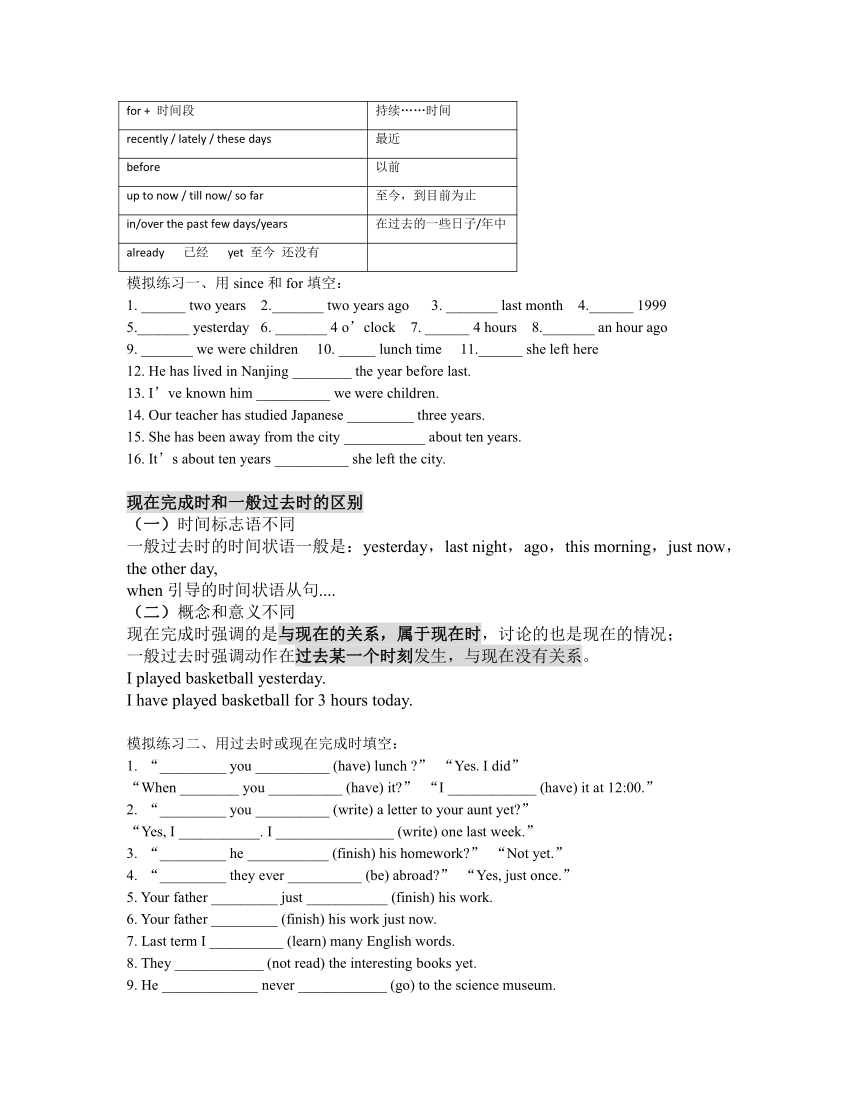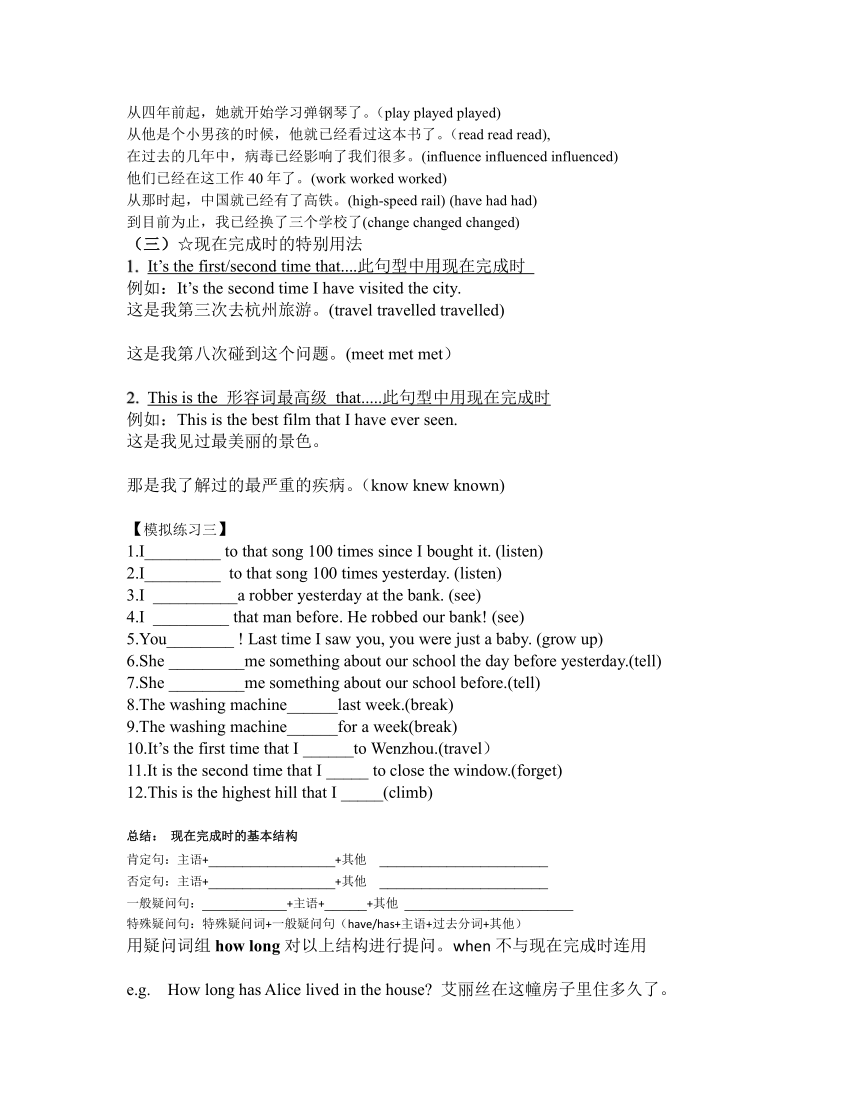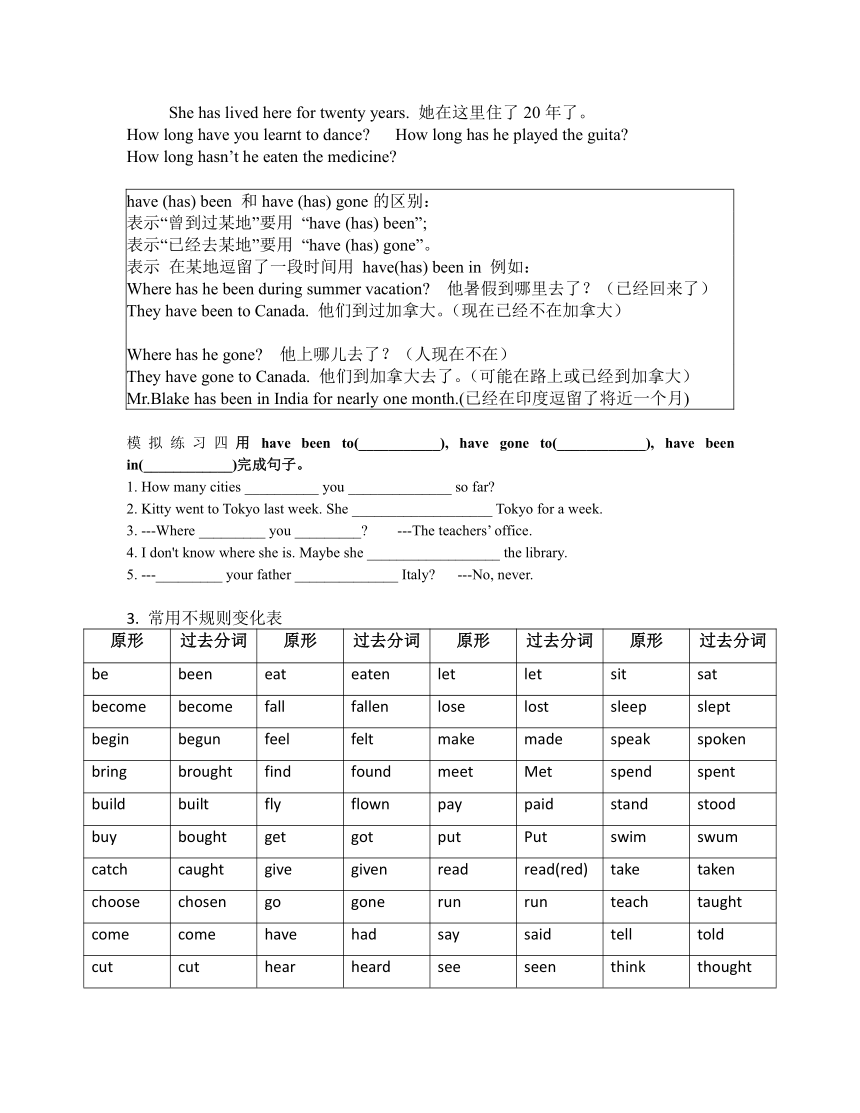Module 3 Journey to space单元语法知识现在完成时及其被动语态2024-2025学年外研版八年级英语下册
文档属性
| 名称 | Module 3 Journey to space单元语法知识现在完成时及其被动语态2024-2025学年外研版八年级英语下册 |

|
|
| 格式 | docx | ||
| 文件大小 | 203.3KB | ||
| 资源类型 | 教案 | ||
| 版本资源 | 外研版 | ||
| 科目 | 英语 | ||
| 更新时间 | 2025-05-05 16:51:34 | ||
图片预览




文档简介
现在完成时专题
现在完成时的结构和时间标志词
现在完成时由助动词have + 过去分词构成,助动词have 有人称和数的变化。第三人称单数用has,其余用have. 现在完成时其否定式、疑问式和简单回答形式如下:
陈述I have learnt English. She has learnt English.
否定I have not/havn’t learnt English.
疑问 Have I learnt English Yes, I have / No I have not.
否定疑问have I not learnt English havn’t I learnt English
特殊疑问句 提问:
I have been here for five years. How long had you been here
She has visited Wuhan four times. How many times has she visited Wuhan
句型转换:
1. He has already gone home.
He ______ _______ home _______. (否定句)_
_______ he _______ home _________ (疑问句)
2. He has lunch at home.
He ______ ______ lunch at home. (否定句)
________ he _______ lunch at home (疑问句)
He has been there twice.
_______ _______ _____ _______ he been there (划线提问)
I have had lunch at school.
_______ _______ you _________ lunch? (划线提问)
判断现在完成时的标志
已经:already(用于肯定句中) I have learnt English already.
(至今)还没有:yet(用于否定/ 疑问)/ I havn’t learnt English yet.
自从:表示的是“自过去某一时间一直延续到现在”,应该用现在完成时。
(1)since +时间段 since two years ago 自从两年前起
since+从句 since I was young 从我年轻的时候起
I have lived in there since two years ago.
She has gotten many prizes since he was in his childhood.
有...久了 for +一段时间 for two years 有两年了 for three weeks 有三周了
since + 时间点* (动词过去式或表示过去的时间词语) from then on 自从……以来
for + 时间段 持续……时间
recently / lately / these days 最近
before 以前
up to now / till now/ so far 至今,到目前为止
in/over the past few days/years 在过去的一些日子/年中
already 已经 yet 至今 还没有
模拟练习一、用since和for填空:
1. ______ two years 2._______ two years ago 3. _______ last month 4.______ 1999
5._______ yesterday 6. _______ 4 o’clock 7. ______ 4 hours 8._______ an hour ago
9. _______ we were children 10. _____ lunch time 11.______ she left here
12. He has lived in Nanjing ________ the year before last.
13. I’ve known him __________ we were children.
14. Our teacher has studied Japanese _________ three years.
15. She has been away from the city ___________ about ten years.
16. It’s about ten years __________ she left the city.
现在完成时和一般过去时的区别
时间标志语不同
一般过去时的时间状语一般是:yesterday,last night,ago,this morning,just now,the other day,
when引导的时间状语从句....
概念和意义不同
现在完成时强调的是与现在的关系,属于现在时,讨论的也是现在的情况;
一般过去时强调动作在过去某一个时刻发生,与现在没有关系。
I played basketball yesterday.
I have played basketball for 3 hours today.
模拟练习二、用过去时或现在完成时填空:
1. “_________ you __________ (have) lunch ” “Yes. I did”
“When ________ you __________ (have) it ” “I ____________ (have) it at 12:00.”
2. “_________ you __________ (write) a letter to your aunt yet ”
“Yes, I ___________. I ________________ (write) one last week.”
3. “_________ he ___________ (finish) his homework ” “Not yet.”
4. “_________ they ever __________ (be) abroad ” “Yes, just once.”
5. Your father _________ just ___________ (finish) his work.
6. Your father _________ (finish) his work just now.
7. Last term I __________ (learn) many English words.
8. They ____________ (not read) the interesting books yet.
9. He _____________ never ____________ (go) to the science museum.
从四年前起,她就开始学习弹钢琴了。(play played played)
从他是个小男孩的时候,他就已经看过这本书了。(read read read),
在过去的几年中,病毒已经影响了我们很多。(influence influenced influenced)
他们已经在这工作40年了。(work worked worked)
从那时起,中国就已经有了高铁。(high-speed rail) (have had had)
到目前为止,我已经换了三个学校了(change changed changed)
☆现在完成时的特别用法
It’s the first/second time that....此句型中用现在完成时
例如:It’s the second time I have visited the city.
这是我第三次去杭州旅游。(travel travelled travelled)
这是我第八次碰到这个问题。(meet met met)
This is the 形容词最高级 that.....此句型中用现在完成时
例如:This is the best film that I have ever seen.
这是我见过最美丽的景色。
那是我了解过的最严重的疾病。(know knew known)
【模拟练习三】
1.I_________ to that song 100 times since I bought it. (listen)
2.I_________ to that song 100 times yesterday. (listen)
3.I __________a robber yesterday at the bank. (see)
4.I _________ that man before. He robbed our bank! (see)
5.You________ ! Last time I saw you, you were just a baby. (grow up)
6.She _________me something about our school the day before yesterday.(tell)
7.She _________me something about our school before.(tell)
8.The washing machine______last week.(break)
9.The washing machine______for a week(break)
10.It’s the first time that I ______to Wenzhou.(travel)
11.It is the second time that I _____ to close the window.(forget)
12.This is the highest hill that I _____(climb)
总结: 现在完成时的基本结构
肯定句:主语+_______________+其他 ____________________
否定句:主语+_______________+其他 ____________________
一般疑问句:__________+主语+_____+其他 ____________________
特殊疑问句:特殊疑问词+一般疑问句(have/has+主语+过去分词+其他)
用疑问词组how long对以上结构进行提问。when不与现在完成时连用
e.g. How long has Alice lived in the house 艾丽丝在这幢房子里住多久了。
She has lived here for twenty years. 她在这里住了20年了。
How long have you learnt to dance How long has he played the guita
How long hasn’t he eaten the medicine
have (has) been 和have (has) gone的区别:
表示“曾到过某地”要用 “have (has) been”;
表示“已经去某地”要用 “have (has) gone”。
表示 在某地逗留了一段时间用 have(has) been in 例如:
Where has he been during summer vacation 他暑假到哪里去了?(已经回来了)
They have been to Canada. 他们到过加拿大。(现在已经不在加拿大)
Where has he gone 他上哪儿去了?(人现在不在)
They have gone to Canada. 他们到加拿大去了。(可能在路上或已经到加拿大)
Mr.Blake has been in India for nearly one month.(已经在印度逗留了将近一个月)
模拟练习四用have been to(___________), have gone to(____________), have been in(____________)完成句子。
1. How many cities __________ you ______________ so far
2. Kitty went to Tokyo last week. She ___________________ Tokyo for a week.
3. ---Where _________ you _________ ---The teachers’ office.
4. I don't know where she is. Maybe she __________________ the library.
5. ---_________ your father ______________ Italy ---No, never.
3. 常用不规则变化表
原形 过去分词 原形 过去分词 原形 过去分词 原形 过去分词
be been eat eaten let let sit sat
become become fall fallen lose lost sleep slept
begin begun feel felt make made speak spoken
bring brought find found meet Met spend spent
build built fly flown pay paid stand stood
buy bought get got put Put swim swum
catch caught give given read read(red) take taken
choose chosen go gone run run teach taught
come come have had say said tell told
cut cut hear heard see seen think thought
do done keep kept sell sold throw thrown
draw drawn know known send sent wear worn
drink drunk learn learnt shine shone win won
drive driven leave left sing sung write written
现在完成时的被动语态一、知识回顾
1.构成: has/have + done(过去分词)
2.用法:
①表示过去发生的/已经完成的某一动作对现在造成的影响/作用
e.g.: I have already read this book.
②表示从过去已经开始,一直持续到现在 也许还会进行下去 的动作/状态
与一般过去时的被动语态的区别。一般过去时的被动语态所表示的动作或状态与现在的情况没有联系,而现在完成时的被动语态则强调与现在的情况有联系。
The park was opened to the public last year.
去年这个公园向公众开放。(说明动作发生于过去)
The park has been opened to the public.
这个公园已向公众开放。(说明动作发生于过去,但对现在有影响,即现在公园已经向公众开放了)
非延续性动词,如 borrow,finish,begin,start,buy,marry,open,join 等构成的现在完成时的被动语态不能与表示一段时间的状语连用。若要表达相应的意思,则要改换动词或时态。
这本书借了一周了。
The book has been borrowed for a week. (x)
The book has been kept for a week. (√)
这个工程已经开始多久了?
How long has this project been started (x) when was this project started (√)
【温馨提示】come/arrive/buy/die/borrow/begin/finish/start 等表示短暂意义的瞬间动词的现在完成时,在肯定句中不能与表示一段时间的状语连用。它们必须用相应的表示延续状态的延续性动词
(词组)连用。
瞬间动词(词组) 对应的延续性动词(词组)
buy have
borrow keep
die be dead
leave be away
catch/get a cold have a cold
come/go here/there be here/there
begin/start be on
finish/end be over
二、现在完成时的被动语态
定义:现在完成时的被动语态表示说话时已经完成的被动性的动作或结果,主语和谓语之间为被动关系,主语是动作的承受者。常译为“......已经被做”。
主动语态变被动语态的原则:
The students have cleaned the classroom.
The classroom has been cleaned by students.
构成:主语 + have/has + been + done + (by…)
表现在完成 表被动
肯定式 主语+have/has done... 主语+have/has been done...
否定式 主语+have/has not done... 主语+have/has not been done...
一般疑问式 Have/Has+主语+ done...? Have/Has+主语+been done...?
特殊疑问式 疑问词+have/has+主语+done...? 疑问词+have/has+主语+been done...?
常用句式:
①A new network has been set up. 一个新的网络已经建立起来了。
②To Tom’s sadness,his novel has not been published. 让汤姆难过的是,他的小说还没有被出版。
③Has his bike been repaired 他的自行车修好了吗?
④How many people have been invited to the meeting?有多少人受到了参会邀请?
带有双宾语的动词,如 give,send,bring,take,teach,show,tell,make,sing,write,read, sell,buy,tell,pay,lend,pass,promise 等,变为被动语态时,可将其中一个宾语变为主语,另一个保留不动。
Tina gave me a dictionary.
was given a dictionary by Tina.
A dictionary was given to me by Tina.
We have given him a lot of cash.
→He has been given a lot of cash.
→A lot of cash has been given to him.
带有复合宾语的动词变为被动语态时,只能将宾语变为主语,原来的宾补改为主语补足语。
原来省略 to 的不定式作宾补的,被动语态中要用带 to 的不定式。
told them to take their identity cards.
→They was told to take their identity cards. 我告诉他们要带上身份证。
I have told them to take their identity cards.
→They have been told to take their identity cards. 我已经告诉他们要带上身份证。
短语动词是一个不可分割的整体,在被动语态中要保持其完整性,其中的介词或副词不可省略。如:主动:Students listened to what the teacher said carefully. 被动:What the teacher said was carefully listened to by students.
主动:They wait for their friends patiently everyday.
被动:
主动:Viewers cheered for the basketball player excitedly yesterday.
被动:
主动:It is said that some people have looked into the problem strictly.
被动:
翻译练习:
Many of my bad habits have been given up.
A new rule was carried out.
Our performance is to be put off till next week.
Ancient buildings are carefully looked after.
The new song is not popular and is hardly listened to.
More attention should be paid to our environment.
Such bad action can't be put up with.
这些小说已经被我看过了。
这把伞从未被任何人使用过。
他至今还没有去过南京。
这是我吃过最美味的食物。
这对双胞胎已经被很多人比较过了。
改错:
These books has been bought by students in the school.
They have lived here three years.
Nothing was happened just now.
While he walked on the street, the rainbow appeared.
Grass on the mountain was eaten by sheep everyday.
I promised that I will be an astronaunt one day.
现在完成时的结构和时间标志词
现在完成时由助动词have + 过去分词构成,助动词have 有人称和数的变化。第三人称单数用has,其余用have. 现在完成时其否定式、疑问式和简单回答形式如下:
陈述I have learnt English. She has learnt English.
否定I have not/havn’t learnt English.
疑问 Have I learnt English Yes, I have / No I have not.
否定疑问have I not learnt English havn’t I learnt English
特殊疑问句 提问:
I have been here for five years. How long had you been here
She has visited Wuhan four times. How many times has she visited Wuhan
句型转换:
1. He has already gone home.
He ______ _______ home _______. (否定句)_
_______ he _______ home _________ (疑问句)
2. He has lunch at home.
He ______ ______ lunch at home. (否定句)
________ he _______ lunch at home (疑问句)
He has been there twice.
_______ _______ _____ _______ he been there (划线提问)
I have had lunch at school.
_______ _______ you _________ lunch? (划线提问)
判断现在完成时的标志
已经:already(用于肯定句中) I have learnt English already.
(至今)还没有:yet(用于否定/ 疑问)/ I havn’t learnt English yet.
自从:表示的是“自过去某一时间一直延续到现在”,应该用现在完成时。
(1)since +时间段 since two years ago 自从两年前起
since+从句 since I was young 从我年轻的时候起
I have lived in there since two years ago.
She has gotten many prizes since he was in his childhood.
有...久了 for +一段时间 for two years 有两年了 for three weeks 有三周了
since + 时间点* (动词过去式或表示过去的时间词语) from then on 自从……以来
for + 时间段 持续……时间
recently / lately / these days 最近
before 以前
up to now / till now/ so far 至今,到目前为止
in/over the past few days/years 在过去的一些日子/年中
already 已经 yet 至今 还没有
模拟练习一、用since和for填空:
1. ______ two years 2._______ two years ago 3. _______ last month 4.______ 1999
5._______ yesterday 6. _______ 4 o’clock 7. ______ 4 hours 8._______ an hour ago
9. _______ we were children 10. _____ lunch time 11.______ she left here
12. He has lived in Nanjing ________ the year before last.
13. I’ve known him __________ we were children.
14. Our teacher has studied Japanese _________ three years.
15. She has been away from the city ___________ about ten years.
16. It’s about ten years __________ she left the city.
现在完成时和一般过去时的区别
时间标志语不同
一般过去时的时间状语一般是:yesterday,last night,ago,this morning,just now,the other day,
when引导的时间状语从句....
概念和意义不同
现在完成时强调的是与现在的关系,属于现在时,讨论的也是现在的情况;
一般过去时强调动作在过去某一个时刻发生,与现在没有关系。
I played basketball yesterday.
I have played basketball for 3 hours today.
模拟练习二、用过去时或现在完成时填空:
1. “_________ you __________ (have) lunch ” “Yes. I did”
“When ________ you __________ (have) it ” “I ____________ (have) it at 12:00.”
2. “_________ you __________ (write) a letter to your aunt yet ”
“Yes, I ___________. I ________________ (write) one last week.”
3. “_________ he ___________ (finish) his homework ” “Not yet.”
4. “_________ they ever __________ (be) abroad ” “Yes, just once.”
5. Your father _________ just ___________ (finish) his work.
6. Your father _________ (finish) his work just now.
7. Last term I __________ (learn) many English words.
8. They ____________ (not read) the interesting books yet.
9. He _____________ never ____________ (go) to the science museum.
从四年前起,她就开始学习弹钢琴了。(play played played)
从他是个小男孩的时候,他就已经看过这本书了。(read read read),
在过去的几年中,病毒已经影响了我们很多。(influence influenced influenced)
他们已经在这工作40年了。(work worked worked)
从那时起,中国就已经有了高铁。(high-speed rail) (have had had)
到目前为止,我已经换了三个学校了(change changed changed)
☆现在完成时的特别用法
It’s the first/second time that....此句型中用现在完成时
例如:It’s the second time I have visited the city.
这是我第三次去杭州旅游。(travel travelled travelled)
这是我第八次碰到这个问题。(meet met met)
This is the 形容词最高级 that.....此句型中用现在完成时
例如:This is the best film that I have ever seen.
这是我见过最美丽的景色。
那是我了解过的最严重的疾病。(know knew known)
【模拟练习三】
1.I_________ to that song 100 times since I bought it. (listen)
2.I_________ to that song 100 times yesterday. (listen)
3.I __________a robber yesterday at the bank. (see)
4.I _________ that man before. He robbed our bank! (see)
5.You________ ! Last time I saw you, you were just a baby. (grow up)
6.She _________me something about our school the day before yesterday.(tell)
7.She _________me something about our school before.(tell)
8.The washing machine______last week.(break)
9.The washing machine______for a week(break)
10.It’s the first time that I ______to Wenzhou.(travel)
11.It is the second time that I _____ to close the window.(forget)
12.This is the highest hill that I _____(climb)
总结: 现在完成时的基本结构
肯定句:主语+_______________+其他 ____________________
否定句:主语+_______________+其他 ____________________
一般疑问句:__________+主语+_____+其他 ____________________
特殊疑问句:特殊疑问词+一般疑问句(have/has+主语+过去分词+其他)
用疑问词组how long对以上结构进行提问。when不与现在完成时连用
e.g. How long has Alice lived in the house 艾丽丝在这幢房子里住多久了。
She has lived here for twenty years. 她在这里住了20年了。
How long have you learnt to dance How long has he played the guita
How long hasn’t he eaten the medicine
have (has) been 和have (has) gone的区别:
表示“曾到过某地”要用 “have (has) been”;
表示“已经去某地”要用 “have (has) gone”。
表示 在某地逗留了一段时间用 have(has) been in 例如:
Where has he been during summer vacation 他暑假到哪里去了?(已经回来了)
They have been to Canada. 他们到过加拿大。(现在已经不在加拿大)
Where has he gone 他上哪儿去了?(人现在不在)
They have gone to Canada. 他们到加拿大去了。(可能在路上或已经到加拿大)
Mr.Blake has been in India for nearly one month.(已经在印度逗留了将近一个月)
模拟练习四用have been to(___________), have gone to(____________), have been in(____________)完成句子。
1. How many cities __________ you ______________ so far
2. Kitty went to Tokyo last week. She ___________________ Tokyo for a week.
3. ---Where _________ you _________ ---The teachers’ office.
4. I don't know where she is. Maybe she __________________ the library.
5. ---_________ your father ______________ Italy ---No, never.
3. 常用不规则变化表
原形 过去分词 原形 过去分词 原形 过去分词 原形 过去分词
be been eat eaten let let sit sat
become become fall fallen lose lost sleep slept
begin begun feel felt make made speak spoken
bring brought find found meet Met spend spent
build built fly flown pay paid stand stood
buy bought get got put Put swim swum
catch caught give given read read(red) take taken
choose chosen go gone run run teach taught
come come have had say said tell told
cut cut hear heard see seen think thought
do done keep kept sell sold throw thrown
draw drawn know known send sent wear worn
drink drunk learn learnt shine shone win won
drive driven leave left sing sung write written
现在完成时的被动语态一、知识回顾
1.构成: has/have + done(过去分词)
2.用法:
①表示过去发生的/已经完成的某一动作对现在造成的影响/作用
e.g.: I have already read this book.
②表示从过去已经开始,一直持续到现在 也许还会进行下去 的动作/状态
与一般过去时的被动语态的区别。一般过去时的被动语态所表示的动作或状态与现在的情况没有联系,而现在完成时的被动语态则强调与现在的情况有联系。
The park was opened to the public last year.
去年这个公园向公众开放。(说明动作发生于过去)
The park has been opened to the public.
这个公园已向公众开放。(说明动作发生于过去,但对现在有影响,即现在公园已经向公众开放了)
非延续性动词,如 borrow,finish,begin,start,buy,marry,open,join 等构成的现在完成时的被动语态不能与表示一段时间的状语连用。若要表达相应的意思,则要改换动词或时态。
这本书借了一周了。
The book has been borrowed for a week. (x)
The book has been kept for a week. (√)
这个工程已经开始多久了?
How long has this project been started (x) when was this project started (√)
【温馨提示】come/arrive/buy/die/borrow/begin/finish/start 等表示短暂意义的瞬间动词的现在完成时,在肯定句中不能与表示一段时间的状语连用。它们必须用相应的表示延续状态的延续性动词
(词组)连用。
瞬间动词(词组) 对应的延续性动词(词组)
buy have
borrow keep
die be dead
leave be away
catch/get a cold have a cold
come/go here/there be here/there
begin/start be on
finish/end be over
二、现在完成时的被动语态
定义:现在完成时的被动语态表示说话时已经完成的被动性的动作或结果,主语和谓语之间为被动关系,主语是动作的承受者。常译为“......已经被做”。
主动语态变被动语态的原则:
The students have cleaned the classroom.
The classroom has been cleaned by students.
构成:主语 + have/has + been + done + (by…)
表现在完成 表被动
肯定式 主语+have/has done... 主语+have/has been done...
否定式 主语+have/has not done... 主语+have/has not been done...
一般疑问式 Have/Has+主语+ done...? Have/Has+主语+been done...?
特殊疑问式 疑问词+have/has+主语+done...? 疑问词+have/has+主语+been done...?
常用句式:
①A new network has been set up. 一个新的网络已经建立起来了。
②To Tom’s sadness,his novel has not been published. 让汤姆难过的是,他的小说还没有被出版。
③Has his bike been repaired 他的自行车修好了吗?
④How many people have been invited to the meeting?有多少人受到了参会邀请?
带有双宾语的动词,如 give,send,bring,take,teach,show,tell,make,sing,write,read, sell,buy,tell,pay,lend,pass,promise 等,变为被动语态时,可将其中一个宾语变为主语,另一个保留不动。
Tina gave me a dictionary.
was given a dictionary by Tina.
A dictionary was given to me by Tina.
We have given him a lot of cash.
→He has been given a lot of cash.
→A lot of cash has been given to him.
带有复合宾语的动词变为被动语态时,只能将宾语变为主语,原来的宾补改为主语补足语。
原来省略 to 的不定式作宾补的,被动语态中要用带 to 的不定式。
told them to take their identity cards.
→They was told to take their identity cards. 我告诉他们要带上身份证。
I have told them to take their identity cards.
→They have been told to take their identity cards. 我已经告诉他们要带上身份证。
短语动词是一个不可分割的整体,在被动语态中要保持其完整性,其中的介词或副词不可省略。如:主动:Students listened to what the teacher said carefully. 被动:What the teacher said was carefully listened to by students.
主动:They wait for their friends patiently everyday.
被动:
主动:Viewers cheered for the basketball player excitedly yesterday.
被动:
主动:It is said that some people have looked into the problem strictly.
被动:
翻译练习:
Many of my bad habits have been given up.
A new rule was carried out.
Our performance is to be put off till next week.
Ancient buildings are carefully looked after.
The new song is not popular and is hardly listened to.
More attention should be paid to our environment.
Such bad action can't be put up with.
这些小说已经被我看过了。
这把伞从未被任何人使用过。
他至今还没有去过南京。
这是我吃过最美味的食物。
这对双胞胎已经被很多人比较过了。
改错:
These books has been bought by students in the school.
They have lived here three years.
Nothing was happened just now.
While he walked on the street, the rainbow appeared.
Grass on the mountain was eaten by sheep everyday.
I promised that I will be an astronaunt one day.
同课章节目录
- Module 1 Feelings and impressions
- Unit 1 It smells delicious.
- Unit 2 I feel nervous when I speak Chinese .
- Unit 3 Language in use
- Module 2 Experiences
- Unit 1 I've also entered lots of speaking competi
- Unit 2 They have seen the Pyramids.
- Unit 3 Language in use
- Module 3 Journey to space
- Unit 1 Has it arrived yet?
- Unit 2 We have not found life on any other planet
- Unit 3 Language in use
- Module 4 Seeing the docto
- Unit 1 I haven't done much exercise since I got m
- Unit 2 We have played football for a year now
- Unit 3 Language in use
- Module 5 Cartoons
- Unit 1 It's time to watch a cartoon.
- Unit 2 Tintin has been popular for over eighty yea
- Unit 3 Language in use
- Revision module A
- Module 6 Hobbies
- Unit 1 Do you collect anything ?
- Unit 2 Hobbies can make you grow as a person.
- Unit 3 Language in use
- Module 7 Summer in Los Angeles
- Unit 1 Please write to me and send me some photos
- Unit 2 Fill out a form and come to learn English
- Unit 3 Language in use
- Module 8 Time off
- Unit 1 I can hardly believe we are in the city ce
- Unit 2 We thought somebody was moving about
- Unit 3 Language in use
- Module 9 Friendship
- Unit 1 Could I ask if you've mentioned this to he
- Unit 2 I believe that the world is what you think
- Unit 3 Language in use
- Module 10 On the radio
- Unit 1 I hope that you can join us one day
- Unit 2 It seemed that they were speaking to me in
- Unit 3 Language in use
- Revision module B
